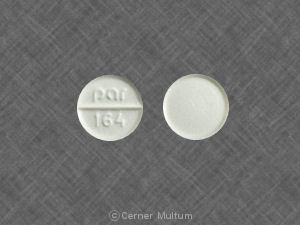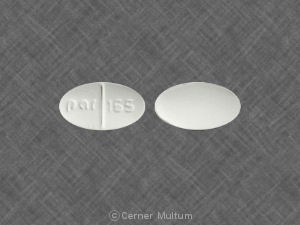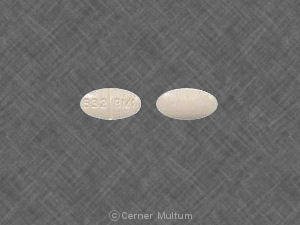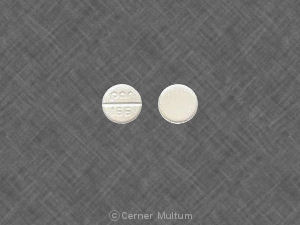What is the most important information I should know about benztropine?
Benztropine is not approved for use by anyone younger than 3 years old.
Certain side effects of benztropine may be more likely in older adults.
What is benztropine?
Benztropine reduces the effects of certain chemicals in the body that may be unbalanced as a result of disease (such as Parkinson's), drug therapy, or other causes.
Benztropine is used together with other medicines to treat the symptoms of Parkinson's disease (muscle spasms, stiffness, tremors, poor muscle control).
Benztropine is also used to treat and prevent these symptoms when they are caused by drugs such as chlorpromazine (Thorazine), fluphenazine (Prolixin), perphenazine (Trilafon), and others.
Benztropine may also be used for purposes not listed in this medication guide.
What should I discuss with my healthcare provider before taking benztropine?
You should not use benztropine if you are allergic to it.
Benztropine is not approved for use by anyone younger than 3 years old.
To make sure benztropine is safe for you, tell your doctor if you have:
- glaucoma;
- mental illness;
- a nerve-muscle disorder;
- a history of alcoholism;
- a bowel or bladder obstruction;
- urination problems;
- kidney disease; or
- if you are severely ill or otherwise debilitated.
Using benztropine during pregnancy could harm the unborn baby. Tell your doctor if you are pregnant or if you become pregnant while using this medicine.
It is not known whether benztropine passes into breast milk or if it could harm a nursing baby. Tell your doctor if you are breast-feeding a baby.
How should I take benztropine?
Follow all directions on your prescription label. Your doctor may occasionally change your dose to make sure you get the best results. Do not use this medicine in larger or smaller amounts or for longer than recommended.
It is best to take benztropine at bedtime, especially if you take this medicine only once per day. Follow your doctor's instructions.
It may take up to 3 days before your symptoms improve. Keep using the medication as directed and tell your doctor if your symptoms do not improve or if they get worse.
Your mouth may feel dry while taking benztropine. To prevent or relieve dry mouth, suck on a piece of sugar-free hard candy, chew sugar-free gum, drink water, chew on ice chips, or use a saliva substitute.
Drink plenty of liquids while you are taking benztropine.
Dry mouth may lead to gum disease or cavities. Brush and floss your teeth regularly and see a dentist for routine check-ups while you are taking benztropine.
You should not stop using any of your anti-Parkinson medications suddenly. Stopping suddenly may make your condition worse.
Store at room temperature away from moisture, heat, and light.
What happens if I miss a dose?
Take the missed dose as soon as you remember. Skip the missed dose if it is almost time for your next scheduled dose. Do not take extra medicine to make up the missed dose.
What happens if I overdose?
Seek emergency medical attention or call the Poison Help line at 1-800-222-1222.
Overdose can cause headache, severe dizziness, anxiety, confusion, trouble swallowing, hot and dry skin, dilated pupils, weak pulse, irregular heartbeats, fainting, or seizure (convulsions).
What should I avoid while taking benztropine?
This medicine may impair your thinking or reactions. Be careful if you drive or do anything that requires you to be alert.
Avoid becoming overheated or dehydrated during exercise and in hot weather. Benztropine can decrease sweating and you may be more prone to heat stroke.
If you also take ketoconazole, do not take it within 2 hours before you take benztropine.
Drinking alcohol with benztropine can cause side effects.
What are the possible side effects of benztropine?
Get emergency medical help if you have signs of an allergic reaction: hives; difficulty breathing; swelling of your face, lips, tongue, or throat.
Call your doctor at once if you have:
- fast or pounding heartbeats;
- confusion, hallucinations;
- severe mouth dryness that causes trouble talking or swallowing;
- loss of appetite, weight loss;
- severe constipation;
- little or no urination;
- blurred vision, tunnel vision, eye pain, or seeing halos around lights;
- severe skin rash;
- fever, severe weakness or dizziness; or
-
dehydration symptoms --feeling very thirsty or hot, being unable to urinate, heavy sweating, or hot and dry skin.
Side effects such as dry mouth, constipation, and confusion may be more likely in older adults.
Common side effects may include:
- nausea, vomiting;
- dry mouth;
- blurred vision; or
- your eyes may be more sensitive to light.
This is not a complete list of side effects and others may occur. Call your doctor for medical advice about side effects. You may report side effects to FDA at 1-800-FDA-1088.
What other drugs will affect benztropine?
Taking this medicine with other drugs that make you sleepy can worsen this effect. Ask your doctor before taking benztropine with a sleeping pill, narcotic pain medicine, muscle relaxer, or medicine for anxiety, depression, or seizures.
Tell your doctor about all your current medicines and any you start or stop using, especially:
- haloperidol;
- a potassium supplement;
- cold or allergy medicine that contains an antihistamine;
- other medications for Parkinson's disease;
- medication to treat excess stomach acid, stomach ulcer, motion sickness, or irritable bowel syndrome;
-
an antidepressant --amitriptyline, doxepin, clomipramine, desipramine, imipramine, nortriptyline, protriptyline, trimipramine;
-
bladder or urinary medicine --darifenacin, fesoterodine, oxybutynin, tolterodine, solifenacin;
-
a bronchodilator --aclidinium, ipratropium, tiotropium, umeclidinium; or
-
a phenothiazine --chlorpromazine, fluphenazine, perphenazine, prochlorperazine, promethazine, thioridazine, trifluoperazine.
This list is not complete. Other drugs may interact with benztropine, including prescription and over-the-counter medicines, vitamins, and herbal products. Not all possible interactions are listed in this medication guide.
Where can I get more information?
Your pharmacist can provide more information about benztropine.
Remember, keep this and all other medicines out of the reach of children, never share your medicines with others, and use this medication only for the indication prescribed.
Every effort has been made to ensure that the information provided by Cerner Multum, Inc. ('Multum') is accurate, up-to-date, and complete, but no guarantee is made to that effect. Drug information contained herein may be time sensitive. Multum information has been compiled for use by healthcare practitioners and consumers in the United States and therefore Multum does not warrant that uses outside of the United States are appropriate, unless specifically indicated otherwise. Multum's drug information does not endorse drugs, diagnose patients or recommend therapy. Multum's drug information is an informational resource designed to assist licensed healthcare practitioners in caring for their patients and/or to serve consumers viewing this service as a supplement to, and not a substitute for, the expertise, skill, knowledge and judgment of healthcare practitioners. The absence of a warning for a given drug or drug combination in no way should be construed to indicate that the drug or drug combination is safe, effective or appropriate for any given patient. Multum does not assume any responsibility for any aspect of healthcare administered with the aid of information Multum provides. The information contained herein is not intended to cover all possible uses, directions, precautions, warnings, drug interactions, allergic reactions, or adverse effects. If you have questions about the drugs you are taking, check with your doctor, nurse or pharmacist.
Copyright 1996-2018 Cerner Multum, Inc. Version: 8.01. Revision date: 2/25/2016.





